Israeli Secularism in the Guttman Center Polls 1990 – 2008
The article below presents findings on Israeli secularism that are largely based on an in-depth study of religious behavior in Israel conducted by the Guttman Center and the Avichai Foundation and show that a vast majority of secular Jews observe certain aspects of Jewish tradition.
The findings presented in this article are mainly from an in-depth study of religious behavior in Israel presented by the Guttman Center and the Avichai Foundation. The past two decades show a fairly stable partition of Israeli society into three groups: 50% self-define as secular, 30% as traditional and 20% as religious or ultra-orthodox. A vast majority of secular Jews observe certain aspects of Jewish tradition, which explains the tendency of most secular Jews to report that they are somewhat observant. Perhaps it is the balance created by the high birth rate of religious groups and the large secular immigration from the FSU, which maintains a relatively static segmentation of Israeli society.
According to the 2008 Democracy Index (poll conducted in the second half of January) 51% of Israeli Jews define themselves as secular, and 19% as religious or ultra-Orthodox (see chart 1). According to the data collected by the Central Bureau of Statistics (CBS) in 2007, which measured the religiousness of the Israeli public according to five possible categories, 7% of Israelis define themselves as "ultra-Orthodox", 10% as "religious", 14% as "traditional religious", 25% as "traditional non-religious", and 44% as "non-religious / secular" (see chart 2) According to a CBS press-release June 12th 2007.. A breakdown of the data collected by the Guttman Center has offered a very similar picture to the one presented by the CBS. The few discrepancies can be explained by slightly different scales (four categories as opposed to five).
Chart 1: Self-definition of religiousness among Israeli Jews –
Four categories (Guttman Center data, 2008)
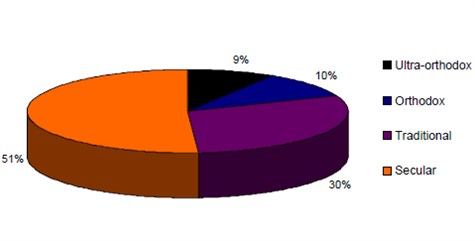
Chart 2: Self-definition of Religiousness among Israeli Jews –
Five Categories (CBS data, 2007)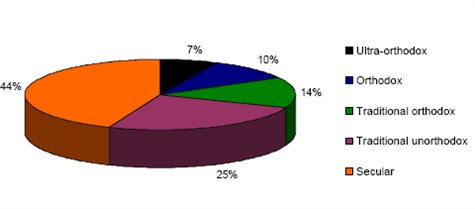
An especially high rate of secular Jews can be found among immigrants from the Former Soviet Union (FSU): 75% define themselves as secular. Examining the data by continent of origin shows that 63% of Ashkenazi Jews (European or North American origin) Israeli Jews born in Europe, North America, Australia or South Africa, or children of Jews born in these areas. define themselves as secular, as opposed to only 32% of Mizrachi Jews (Asian or African origin)Israeli Jews born in Asia or Africa, or children of Jews born in these areas.; 44% of third-generation native Israelis see themselves as secular (see chart 3).
Chart 3: Self-definition by ethnic groups
(Guttman Center data, 2008)
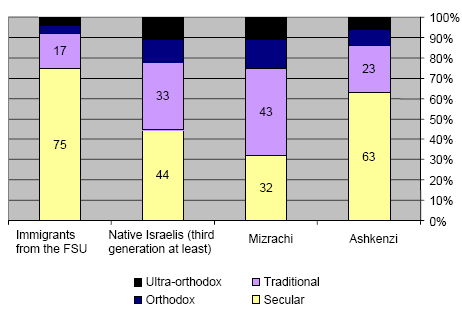
It seems that younger Israeli Jews are generally more traditional and religious than the older population (see chart 4). This finding can be explained by higher birth rates among the religious and traditional Jews in Israel.
Chart 4: Self-definition by Age Group
(Guttman Center data, 2007)
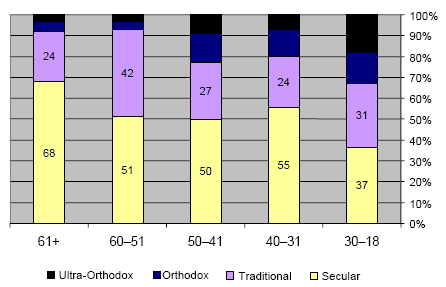
In addition to the standard self-definition (as ultra-Orthodox, Religious, Traditional or Secular), it is common in Israeli polls to ask the participants to rate the level of their religious observance. According to the 2008 Democracy Index 13% of Israelis are fully observant, 22% are very observant, 48% are somewhat observant and 17% non-observant (see chart 5).
Chart 5: Degrees of Observance of Jewish Tradition and Religion
(Guttman Center data, 2008)

The data collected show that a significant portion of secular Jews in Israel report that they are religiously observant to some extant. According to the 2008 Democracy Index only 32% of secular Jews are non-observant (see chart 6). An in-depth study of religious behavior in Israel, conducted in the year 2000 as a co-operation between the Guttman Center and the Avichai Foundation, shows that a vast majority of secular Jews observe certain aspects of Jewish tradition (eat kosher food, refrain from driving on Shabbat, fast on Yom-Kippur, do not eat Chametz on Pesach, light Chanukah candles etc.), which explains the tendency of most secular Jews to report that they are somewhat observantShlomit Levy, Hanna Levinsohn and Elihu Katz, February 2002. A Portrait of Israeli Jewry: Beliefs, Observances, and Values among Israeli Jews [Hebrew] Jerusalem: IDI.. According to the 2008 survey, only a third of immigrants from the FSU report non-observance.
Chart 6: Degrees of Religious Observance among
Secular, Traditional, Religious and Ultra-Orthodox Jews in Israel
(Guttman Center data, 2007)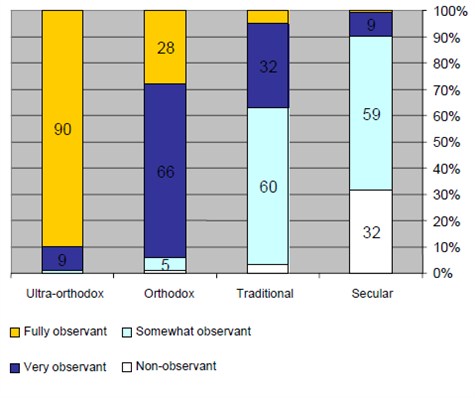
When the answers to the two questions are united in one chart (as was done in the joint study with the Avi-Chai Foundation mentioned above), it is evident that the situation has remained stable over the years, and the most common category (approximately one-third of all Israeli Jews) is comprised of those who define themselves as somewhat-observant secular Jews (see chart 7).
Chart 7: Degrees of Religious Observance among Israeli Jews –
Seven Categories
(Guttman Center data, 1999–2008, in percentages)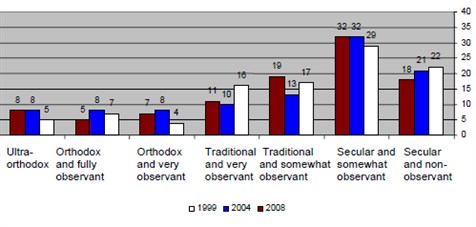
When religious observance is regrouped in only three categories, the data show that Israeli Jewish society cannot be construed on the whole as a religious observant group (see chart 8). Nearly 70% of Israelis report non-observance, partial observance or slight observance. According to the CBS (as of 2007) 69% of Israeli Jews define themselves as "non-religious". This statistic is identical to the rate of non-observance, partial observance and slight observance found in the Guttman Center 2008 data.
Chart 8: Degrees of Religious Observance among Israeli Jews –
Three Categories (Guttman Center data, 1999 – 2008, in percentage)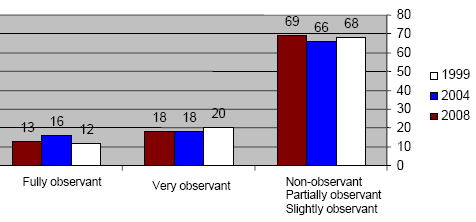
According to the Guttman Center data, there has been an increase in the rate of secular Jews since the early 1990s. The reason is probably the immigration from the FSU, which consists mainly of secular JewsThe analysis is based on two surveys conducted by the Guttman Center and the Avichai Foundation in the years 1991 and 1999, and on the Democracy Index of 2008. The findings from the early 1990s are based on a survey conducted by the Avichai Foundation in August 1990..
Chart 9: The Rate of Secularism 1990 – 2008
(Guttman Center data, in percentage)
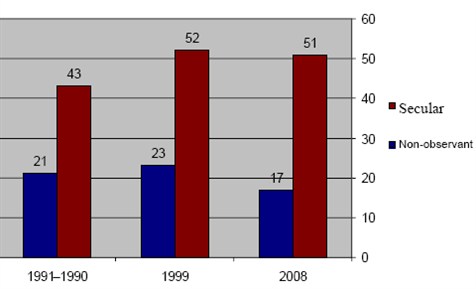
In conclusion, the past two decades show a fairly stable partition of Israeli society into three groups: 50% define themselves as secular, roughly 30% as traditional and 20% as religious or ultra-orthodox. Be that as it may, only one-fifth of Israeli Jews declare complete non-observance, and the most popular approach is partial observance of Jewish tradition. It seems that the contradicting trends within Israeli society – the high birth rate of the traditional and religious (especially ultra-Orthodox) groups as opposed to a large secular immigration from the FSU – have led to maintaining a relatively static segmentation of Israeli society into ultra-Orthodox, religious, traditional and secular Jews.
